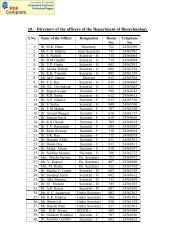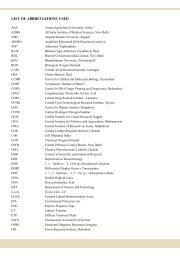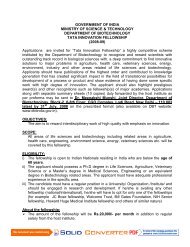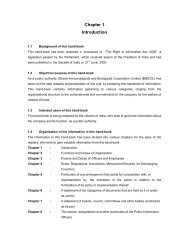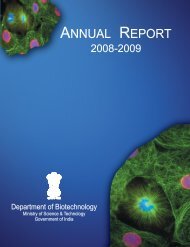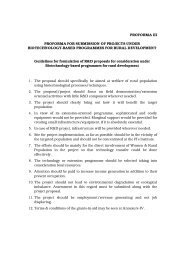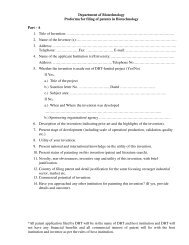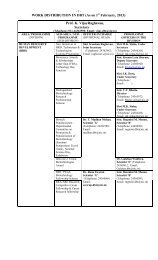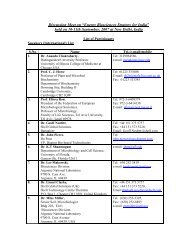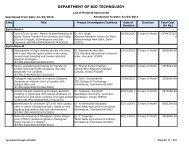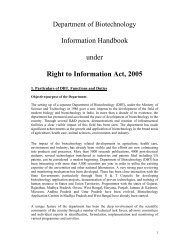ANNUAL REPORT - Department of Biotechnology
ANNUAL REPORT - Department of Biotechnology
ANNUAL REPORT - Department of Biotechnology
Create successful ePaper yourself
Turn your PDF publications into a flip-book with our unique Google optimized e-Paper software.
the reporting period. Out <strong>of</strong> these, approximately<br />
20,500 plants have been dispatched to various<br />
private growers. Approximately 55,800 plants <strong>of</strong> Aloe<br />
vera were dispatched to private growers during 2006.<br />
Over 12,000 plants <strong>of</strong> a natural sweetener, Stevia<br />
rebaudiana were dispatched to various private<br />
growers in and around Delhi-Gurgaon region. Largescale<br />
production <strong>of</strong> medicinal plant, Swertia chirata,<br />
was carried out and approximately 30,000 plants<br />
were dispatched. Approximately 4000 plants <strong>of</strong><br />
'Lahul Bitter' variety <strong>of</strong> Hops were supplied to a<br />
private group. This production was taken up as a<br />
contract production order.<br />
Micropropagation Technology Park, NCL, Pune<br />
Extensive R&D was carried out on the<br />
micropropagation <strong>of</strong> identified crops species.<br />
Following tree species were selected based on<br />
economic importance and requirement <strong>of</strong> user<br />
groups-Acacia mangium ,Casuarina equisetifolia,<br />
and Jatropha curcas. Extensive work on<br />
development and refinement <strong>of</strong> micropropagation<br />
protocols for economically important plants at tissue<br />
culture pilot plant, NCL, Pune have led to<br />
development <strong>of</strong> micropropagation technologies<br />
which have been tested for technocommercial<br />
feasibility by the way <strong>of</strong> large number <strong>of</strong> field<br />
verificatory trials, benefit to cost ratio analysis and<br />
technology transfer to industries. With a view to<br />
generate awareness about the superiority <strong>of</strong> tissue<br />
culture raised propagules among the farmers and<br />
user agencies, small scale demonstration plots using<br />
tissue culture propagules for horticulture crops and<br />
forest tree species have been established under this<br />
project. For horticulture species five demonstration<br />
plots were established using tissue culture raised<br />
propagules <strong>of</strong> banana, turmeric, ginger,<br />
chlorophytum and patchouli. It was observed that<br />
tissue culture raised plants showed higher growth as<br />
compared to conventional plants. Growth <strong>of</strong> Banana<br />
var. mahan was best amongst the banana tissue<br />
culture raised plants. Two ratoon crops <strong>of</strong> these<br />
tissue culture raised banana were taken. The<br />
average yield was 30-40 kg/plant. The explants were<br />
taken from these plants for tissue culturing by a local<br />
tissue culture laboratory. These plants also exhibited<br />
early bearing capacity and higher yield (30-<br />
DBT Annual Report 2006-07<br />
36<br />
40kg/plant). This has lead to generation <strong>of</strong><br />
awareness among the farmers, that tissue culture<br />
propagules remain disease free for 3-4 generations,<br />
and exhibit early bearing, uniformity and higher yield.<br />
In turmeric, the average yield was approximately<br />
double as compared to the conventional plants. Two<br />
thousand ginger rhizomes were given for field trial to<br />
a farmer who conducted the trial near Narayangaon<br />
Dist. Pune. Rhizomes with a weight <strong>of</strong> 7-10 g have<br />
shown the highest survival rate.<br />
For forest trees species seven demonstration plots<br />
were established using tissue culture raised<br />
propagules <strong>of</strong> Teak and Bamboo in which two<br />
agencies, two research institutes, one farmer and<br />
one seed company are involved. A field trial on teak<br />
was carried out through Choudhary Plantation Ltd at<br />
Raipur, Chattisgarh. It was observed that the height<br />
<strong>of</strong> tissue culture raised trees was more than that <strong>of</strong><br />
local variety. Tissue culture raised teak trees grew<br />
straight with fewer branches; hence the commercial<br />
bole realization will be more. Tissue culture teak trees<br />
had fewer branches on the lower portion and thus<br />
expenses <strong>of</strong> labour for pruning can be saved. The<br />
problem <strong>of</strong> nodes was also less. A clonal trial on teak<br />
using three clones <strong>of</strong> tissue culture raised propagules<br />
<strong>of</strong> teak has been conducted at Miraj, Sangli,<br />
Maharshtra through Shree Swami Samarth agency<br />
since June 2002. The plants are over 4 years old now.<br />
Field data recorded during the year indicate that<br />
Clone A and Clone B are exhibiting better growth than<br />
Clone C. This trial has again proved that tissue<br />
culture raised plants exhibit higher uniformity and<br />
biomass.<br />
A field trial on two species <strong>of</strong> Bamboo viz<br />
Dendrocalamus strictus and Bambusa bambos is<br />
being carried out through Kerala Forest Research<br />
Institute, Thrissur. A total <strong>of</strong> 4000 no. <strong>of</strong> tissue culture<br />
raised plants <strong>of</strong> bamboo were supplied to KFRI.<br />
These plants survived the transporting shock and<br />
have been field planted in the month <strong>of</strong> November,<br />
2006. A total <strong>of</strong> 3000 tissue culture raised Bambusa<br />
bambos plants have been supplied to West Bengal<br />
State Council <strong>of</strong> Science and Technology, Kolkata for<br />
field trial. These plants have been field planted in 5<br />
hectare area and are reported to show high survival<br />
rates and good growth.



